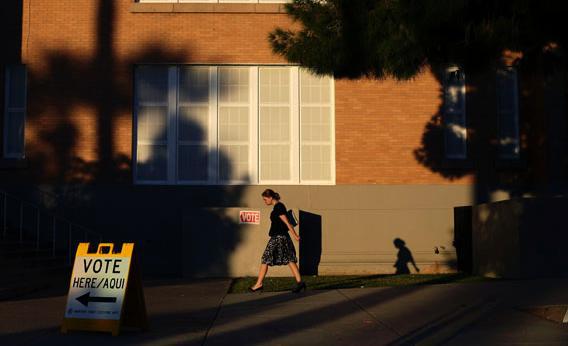You’ve probably heard that the Supreme Court may be on the verge of striking down an integral part of the Voting Rights Act. That case, however, is not the only chance that the highest court will have this term to affect voting rights around the country. On Monday, the justices will hear oral arguments in Arizona v. Inter Tribal Council of Arizona, Inc., a case that concerns Arizona’s power to impose its own conditions on top of the federal rules for voter registration.
The case began as a challenge to Proposition 200, an initiative passed by Arizona voters in 2004 that requires voters to prove that they are U.S. citizens by showing a birth certificate, passport, driver’s license, naturalization certificate, or tribal document before registering and also to show identification when casting their ballots. Under the law, state election officials must reject any voter registration forms not accompanied by sufficient evidence of citizenship—even the federal form produced by Congress under the National Voter Registration Act (NVRA), which doesn’t generally require the documents Arizona does.
The NVRA, passed in 1993 and sometimes known as the “Motor Voter Act,” was designed to expand access to the polls and increase voter participation by making it easier for Americans to register to vote. The idea was to simplify complicated and varying local rules, making them unified and straightforward. Congress gave a federal agency, the Electoral Assistance Commission, the power to develop the new Motor Voter registration form. The form the commission produced requires voters to swear under penalty of perjury that they are United States citizens, but it does not ask for documentation to prove it. The NVRA says that states can still use their own forms, but they have to meet the federal standards, and they have to also accept the federal form—which Arizona does not without the extra documents.
The groups challenging Arizona’s law, in addition to the Inter Tribal Council, include the League of Women Voters, the League of United Latin American Citizens Arizona, and the Hopi tribe. The groups say they represent Native American and Latin American citizens who are likely to be disenfranchised by the state’s proof of citizenship requirements. A recent study showed that voter ID laws have the strongest impact on young voters, especially young minorities. The groups bringing suit argue that the federal government has the power to set the rules for elections for federal office, including voter registration, and states can’t impose additional conditions for voting when Congress has already established the rules.
On appeal, the U.S. Court of Appeals for the 9th Circuit agreed, ruling that Arizona’s requirements conflicted with the NVRA and were preempted by the federal law. In other words, the state butted into an area that Congress controls. Arizona argues that its proof of citizenship law is consistent with the federal requirements, and that the 9th Circuit has wrongly allowed decisions by a federal agency (the Electoral Assistance Commission), not Congress, to pre-empt state law. According to Arizona, the NVRA allows for state-specific election procedures, and the state statute is a legitimate attempt to combat voter fraud and protect the integrity of elections. Critics of this claim point to a study that found only seven cases of voter fraud in Arizona since 2000, only two of which were for non-citizens casting ineligible votes.
So who does get to set the rules for how Americans vote—the state or the federal government? The Constitution’s answer is, essentially, both. The states are given the power in the Elections Clause in Article I, Section 4 to prescribe the “times, places and manner of holding elections,” but Congress may “at any time by law make or alter such regulations.” The 9th Circuit said that this means once the federal government sets the rules for federal elections, states can’t impose conflicting laws covering the same ground. The Supreme Court will decide if that’s the correct interpretation of the Constitution’s dual doling out of responsibilities.
The 2012 election season saw increasingly creative attempts by state legislatures to restrict access to the polls in the name of combatting voter fraud, from new voter ID laws to cutting down on early voting. The challenge to Arizona’s law, like suits that stopped voter ID laws in states like Pennsylvania, Wisconsin, and South Carolina, is an effort to push back, especially on behalf of minority voters. We’ll get our first glimpse Monday of the Supreme Court’s take on whether states can make voters prove their citizenship before they cast a ballot.
